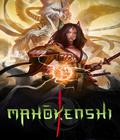It can be difficult to stand out in a crowded market, and nowhere is that more true than the roguelike deck builder genre. There are dozens, if not hundreds, of the games on the market in various states of Early Access and completion, and often, the only way to distinguish them is to play them. Mahokenshi defines itself right off the bat and tries something new and exciting for the genre. I'm not sure it hits all of the marks, but it shows that the genre still has room to grow.
To begin, Mahokenshi is very much a deck builder in the Slay the Spire vein. All the same basic rules still apply. You have limited energy per turn, which you can use to play cards from your randomized deck. Some deal damage, some provide armor, and some provide passive benefits. Battle plays out with enemies using pre-determined attacks, and you having to find the best choice from your drawn cards to counter those attacks with minimal damage.
Mahokenshi separates itself from other deck builders by taking its inspiration from turn-based strategy games. Rather than a single arena, you have an entire hex-based game board to explore. This takes the place of both the battle screen and post-battle travel screens that are so common in modern deck builders. All the standard options (upgrading cards, gaining passive bonuses, etc.) are areas on the map.
The game board isn't just skin-deep. Like more traditional strategy games, each space on the board has distinct strengths and weaknesses. Forests offer bonuses to your defense but take longer to travel through. Mountains are nearly impassible for most standard movement but can become an incredible advantage if you have a way to scale them. This works for both friend and foe, so it's important to pick your battles, since enemies will aggressively try to position themselves in areas that are beneficial for them.
Likewise, this means that you don't have "set" enemy encounters. Instead, you can choose to engage foes as you like, which means it's possible to lure foes to an advantageous location, snipe a strong one from a distance, so you don't have to deal with weaker minions, or find a good choke point so enemies can only come at you one at a time. Characters even have special movement cards that don't have a huge benefit in combat but allow you to do things such as fly, giving you a great way to avoid encounters or start them in a great position.
You have four different available characters, each of whom has their own distinct gimmicks. One is immensely defensive and can turtle up, another is swift and agile, and another specializes in debuffs. Each character levels up as you play them, which primarily unlocks new cards or relics they can use. There's also a passive tree to unlock permanent buffs for all characters; it requires you to complete sub-objectives and offers anything from upgraded cards to powerful stat boosts.
I respect what Mahokenshi is going for, but I think the pacing ends up being a net negative. One of the most appealing parts of deck builders is that they are swift and breezy. Each round matters, and the semi-random nature of the decks and draws encourages you to make as much out of every round as you can. Mahokenshi encourages slow movement and grinding up cards each time, and that ends up dragging down things. Instead of the rapid pace that makes deck builders so addictive, it feels like a bit of a slog. The switch in perspective also hurts the "one more round" feeling.
It doesn't help that Mahokenshi is rather easy. Since each level has you starting from scratch, there's a whole lot less room for the game to build in difficulty and complexity; you're effectively starting a fresh game every time you go to a new level. The result is that enemies can be difficult and relentless, but they also have to be attuned to building up your characters from scratch. Once you realize what the best rush builds are, it's a case of RNG being relatively merciful.
The result is a game that has its moments but lacks the addictive nature of other offerings in the genre. I didn't dislike it, but I also didn't feel a particularly strong urge to rush back to it. I don't see myself going back to it time and time again the way I do with Slay the Spire and Monster Train.
It doesn't help much that the presentation is slightly lackluster. The character models and environmental designs are nice but occasionally can be muddled and difficult to read. This isn't a problem on PC screens, but Steam Deck players may feel different. The audio side of the game also lands firmly on "not memorable," with little in the way to distinguish it. It fits perfectly well with the aesthetics of the game, but it also doesn't stand out.
Mahokenshi has a cool concept and plenty of high moments. It lacks that special something to separate a good deck builder from a great deck builder. It's too slow, too repetitive, and a touch too easy. Even taking that into account, you'll still get hours of gameplay out of the loop, and if that works for you, it's easy to see it becoming a niche favorite. With the deck builder market so crowded, Mahokenshi doesn't stand out as much as it should, but it's still a well-made game.
Score: 7.5/10
More articles about Mahokenshi













 Mahokenshi is a unique blend of adventure, deck-building and deep hex-grid strategy.
Mahokenshi is a unique blend of adventure, deck-building and deep hex-grid strategy.







